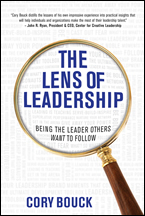Article first published as http://blogcritics.org/book-review-the-lens-of-leadership-by-cory-bouck/ on Blogcritics.
June 6, 2013
The Lens of Leadership:
Being the Leader Others Want to Follow
Cory Bouck
Aviva Publishing (2013)
ISBN: 9781935586890
New Book Advocates Leadership Through Serve-Build-Inspire Model
 A lot of books on leadership exist, and so do a lot of books about how to run a business or organization. Cory Bouck’s new book The Lens of Leadership stands out because it uses a “Serve-Build-Inspire” model that is really not about the leader but his or her followers. In fact, Cory begins by stressing that people who want to be leaders have to start by learning how to be followers, and from there, he goes on to discuss how leaders should lead and treat their followers.
A lot of books on leadership exist, and so do a lot of books about how to run a business or organization. Cory Bouck’s new book The Lens of Leadership stands out because it uses a “Serve-Build-Inspire” model that is really not about the leader but his or her followers. In fact, Cory begins by stressing that people who want to be leaders have to start by learning how to be followers, and from there, he goes on to discuss how leaders should lead and treat their followers.
Cory, who coined the term, defines The Lens of Leadership as “an accountability mindset. I believe all successes and failures have their roots in leadership, and that people in positions of leadership bear responsibility for those successes and failures. Great leaders are not afraid to have their results examined through The Lens of Leadership.”
Another leadership aspect that I appreciated Cory writing about is how leading is about serving. People should not become leaders because they are proud. Cory focuses on the importance of humility for leaders, but also the nobility of being a leader, stating, “all leadership is noble. The act of leading, done well, improves the material and emotional welfare of others. It is a noble act, worthy of pride and respect.”
While many managers and business leaders will talk about setting boundaries with employees in the workplace, Cory believes in taking care of your employees, which means getting to know them as “whole people.” Doing so will result in your team members respecting you, and they will then be more highly engaged and unleash their creativity to deliver better results in the workplace.
I especially appreciated Cory’s use of the term “servant leader” because it’s really what he describes throughout the book. But serving does not mean spoon-feeding or taking care of employees. It means helping them to help themselves, teaching them how to grow as individuals and as professionals so they will be “healthier, wiser, freer, more autonomous, and more likely themselves to become servant-leaders.”
Beyond his concepts of what leaders are, Cory also offers practical advice and examples. As a former manager myself, I know two of the most difficult parts of being a leader are finding the right employees and also having to fire the wrong employees. Cory offers helpful hiring and interviewing tips, but I was most impressed with how he handled the issue of firing people, asking leaders to ask themselves what role they have played in an employee’s public failure. I agree with him that rarely should an employee need to be fired. Leaders simply need to communicate properly with employees. I believe that following Cory’s advice throughout this book can lead any leader to creating the kind of a team where firing people will be a rare—if ever—experience.
I also appreciated how Cory quoted other great leaders. If it’s true that we are the sum of the five people we most associate with, Cory has been very lucky to have worked with and followed some great leaders in the past who have been great role models to him in becoming a leader. Just one example is Ralph Stayer, president of Johnsonville Sausage, who tells employees, “I can’t promise you that Johnsonville will be here tomorrow. Who knows what might happen? But I will promise you that I will invest in programs that help you increase your skills so that you can provide for your family if you no longer worked for Johnsonville. No one can take those skills away from you, ever. Most companies use people to build their business. We are going to use our business to build people.”
Cory’s own diverse background has allowed him to meet many amazing leaders. He has attended the naval academy, been a naval flight officer, and later he taught at the naval academy before he entered the corporate world, leading marketing teams at General Mills, Newell-Rubbermaid, and Johnsonville Sausage. This mixture of military and corporate worlds, combined with Cory’s common sense, his care for his employees, and his efforts throughout his life to learn from whatever role or situation he has faced makes The Lens of Leadership a powerful book, for both aspiring leaders, those who feel they need help in their leadership roles, and even those who are already excellent leaders but always open, like Cory, to improving and inspiring even more.
For more information about Cory Bouck and The Lens of Leadership, visit www.TheLensofLeadership.com
— Tyler R. Tichelaar, Ph.D. and author of the award-winning Narrow Lives

